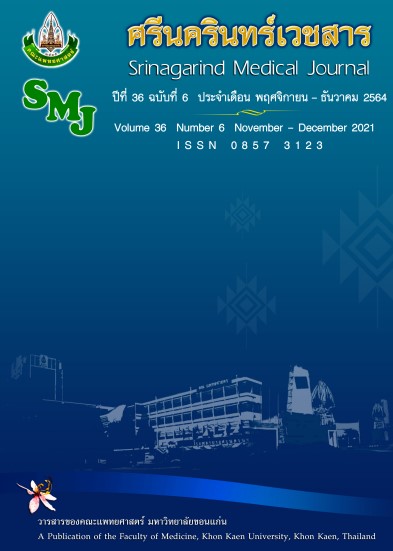Effect of the Depression Prevention Program in Antepartum and Postpartum Women
Keywords:
Depression Prevention Program, pregnant woman depression, postpartum depressionAbstract
Objective: To compare the mean of pre- and post-natal depression scores between the groups receiving the depression prevention program and receiving regular nursing care.
Methods: This was a quasi-experimental research: pretest and posttest design with a comparison group. The studied subjects were 200 pregnant women aged 15-44 years old receiving antenatal care and had delivered their babies in Kalasin provinaial hospital during April – September 2021. The experimental group (n=100) received antenatal care and postpartum care and the control group (n=100) received routine care. The research instruments included 5 parts of questionnaire, i.e. 1) General personal information, 2) Epidemiological studies Depression Scale (CES-D) (Thai version), 3) The Rosenberg’s Self Estean Scale (RSES), 4) Social support data and 5) The Maternal Role Affainment Scale (MRAS). The data were analyzed by computer program by distribution, frequency, percentage, range, mean, standard deviation. and testing the differences in the characteristics of the samples in various aspects. Test the difference of the data by using the Dependent t-test statistic at Continuous data. Test the difference of the data by using the Chi –Square test at Categorical data
Results: When compare the mean of post-natal depression scores, it was found that the groups of Pregnancy receiving the depression prevention program (7.01±2.25) was statistically significantly lower (p<0.05) than the group of pregnancy receiving regular nursing care (13.96±2.11). Post-natal after 24 hour post-receiving the depression prevention program (6.75±1.25) was statistically significantly lower the mean score post-natal after 24 hour pre-receiving the regular nursing care (16.55±1.00). Post-natal after 1-3 week post-receiving the depression prevention program (6.50±1.00) was statistically significantly lower the mean score post-natal after 1-3 week pre-receiving the regular nursing care (16.75±1.00). Post-natal after 4-6 week post-receiving the depression prevention program (6.50±1.25) was statistically significantly lower the mean score than pre-natal after 1-3 week pre-receiving the regular nursing care (16.25±1.75). The mean of The Rosenberg’s Self-Esteem scores, Social support score and The Maternal Role Attainment Score of Post-natal after 24 hour post-receiving the depression prevention program (41.00±2.50) was statistically significantly higher the mean score pre-natal after 24 hour post-receiving the depression prevention program
Conclusion: The Postnatal Depression Prevention Program could reduce postnatal depression.
References
กรมสุขภาพจิต. (2563). 10 กันยายน ป้องกันการฆ่าตัวตายโลก กับ 10 เรื่องที่ควรรู้!. 10 กันยายน 2563 [สืบค้นเมื่อ 5 กุมภาพันธ์ 2564] สืบค้นจาก : https://www.dmh.go.th/news-dmh/view.asp?id=30428,
กรมสุขภาพจิต. (2564). สลดปี 63 ตัวเลขคนไทยฆ่าตัวตายสูงลิ่ว กรมสุขภาพจิตแนะสำรวจตนเอง. [สืบค้นเมื่อ 5 กุมภาพันธ์ 2564] สืบค้นจาก: https://www.dmh.go.th/news-dmh/view.asp?id=30594
ไพบูลย์ วรรณศิริ. ความชุกและปัจจัยเสี่ยงที่มีความสัมพันธ์กับภาวะซึมเศร้าในหญิงตั้งครรภ์ที่แผนกฝากครรภ์ของโรงพยาบาลจังหวัดกาฬสินธุ์. วารสารวิจัยและพัฒนาระบบสุขภาพ สำนักงานสาธารณสุขจังหวัดกาฬสินธุ์ 2563; 14(1): 485-492.
วรรณี นวลฉวี, ทวีศักดิ์ กสิผล, กนกพร นทีธนสมบัติ. ความชุกของภาวะซึมเศร้าหลังคลอดและปัจจัยทำนายภาวะซึมเศร้าหลังคลอดในมารดาหลังคลอด. วารสารมหาวิทยาลัยหัวเฉียวเฉลิมพระเกียรติ วิชาการ 2561; 21(42): 65-78.
ชญานิน บุญพงษ์มณี, Zauszniewski Pezzullo, จันทนา สการกุล. การศึกษาเปรียบเทียบพฤติกรรมการเสาะแสวงหาวิธีทางความปลอดภัย: หญิงตั้งครรภ์ที่ติดเชื้อและไม่ติดเชื้อ เอช ไอ วี. วารสารวิจัยทางการพยาบาล 2546; 7(3): 161-174.
Juliana Dos Santos Vaz, Dayana Rodrigues Farias, Amanda Rodrigues Amorim Adegboye, Antonio Egidio Nardi, Gilberto Kac2.Omega-3 supplementation from pregnancy to postpartum to prevent depressive symptoms: a randomized placebocontrolled trial. BMC Pregnancy Childbirth 2017; 17: 180.
Srisaeng P. Self-esteem, Stressful Life Events, social support, and postpartum depression in adolescent mothers in Thailand. Cleveland, Ohio: Case Western Reserve University, 2003.
ศรีสมร ภูมนสกุล, อรพรรณ สมบูรณ์ทรัพย์,อุษา ศิริวัฒนโชค. การพัฒนาแบบวัดความสำเร็จในการดำรงบทบาทมารดา: ฉบับปรับปรุง และคุณสมบัติทางด้านการวัด. วารสารพยาบาลศาสตร์ 2547; 22(1): 28-38.
Piyathida Chanda. The prevalence and an effect of the informational program to reduce depression on depression in teenage pregnancy. Chaiyaphum Med J 2017; 37(3): 5-15.
เสาวลักษณ์ เสียงนัน. ผลของโปรแกรมการส่งเสริมความมีคุณค่าในตนเองในการปฏิบัติบทบาทการเป็นมารดาต่อภาวะซึมเศร้าหลังคลอดในมารดาวัยรุ่นเป็นการวิจัยกึ่งทดลอง กลุ่มตัวอย่างมารดาวัยรุ่น 15 -19 ปี ที่มารับบริการฝากครรภ์และคลอดบุตรที่โรงพยาบาลชุมชน จังหวัดชลบุรี. พยาบาลศาสตรมหาบัณฑิต สาขาวิชาการพยาบาลเวชปฏิบัติชุมชน คณะพยาบาลศาสตร์ มหาวิทยาลัยธรรมศาสตร์, 2561.
Downloads
Published
How to Cite
Issue
Section
License
Copyright (c) 2021 Srinagarind Medical Journal

This work is licensed under a Creative Commons Attribution-NonCommercial-NoDerivatives 4.0 International License.




